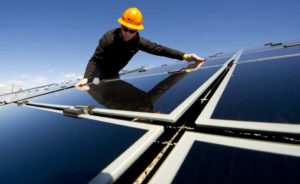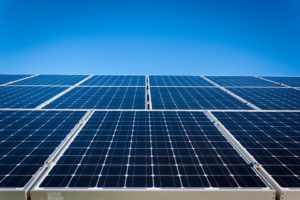As more studies are released and dire environmental warnings continue to be issued, it is clear that we must act now and boldly if we want to stabilize our warming planet. Limiting global warming to 1.5°C will require a transition away from dirty forms of energy towards cleaner, renewable energy sources. In so doing, we must also recognize the need for what’s been termed a “Just Transition,” an acknowledgement that people and communities who have historically relied on jobs and industries that have polluted our environment will need other environmentally sustainable economies to take their place. As fossil fuel companies close their doors, communities stand to lose hundreds of jobs, lose a large portion of their tax base, and to inherit a legacy of pollution, including coal ash.
 Acknowledgement of the need for a just transition has grown in recent years. The 2015 Paris Agreement solidified the need in the climate movement when it stated,“Taking into account the imperatives of a Just Transition of the workforce and the creation of decent work and quality jobs in accordance with nationally defined development priorities.” The U.S. House Green New Deal Resolution which recently has been making headlines across the country mentions a “Just Transition” in its first point. It states that the government is duty bound to, “achieve net-zero greenhouse gas emissions through a fair and just transition for all communities and workers.”
Acknowledgement of the need for a just transition has grown in recent years. The 2015 Paris Agreement solidified the need in the climate movement when it stated,“Taking into account the imperatives of a Just Transition of the workforce and the creation of decent work and quality jobs in accordance with nationally defined development priorities.” The U.S. House Green New Deal Resolution which recently has been making headlines across the country mentions a “Just Transition” in its first point. It states that the government is duty bound to, “achieve net-zero greenhouse gas emissions through a fair and just transition for all communities and workers.”
Engaging Communities
There is a saying in the labor movement that “Transition is assured. Justice is not.” The transition to a clean energy economy is already underway due to U.S. coal plant age and ever cheaper renewables. How we handle issues of justice and equity during the change is up to us. A just transition to renewable energy will involve engaging these communities and workers and supporting them with resources and policies to advance social, environmental, and economic solutions.
Following a nationwide trend, Illinois has started to see the transformation of our energy system with coal plants closing in Wood River, Vermilion, Meredosia, and Hutsonsville recently, and Dynegy-Vistra threatening closure of additional downstate power plants. Thanks to the Future Energy Jobs Act, we’ve seen great increases in solar job growth, but we haven’t seen specific policies targeting development in transitioning communities.
Plans and Policies
Despite the stated need, it is clear that a just transition will not happen by itself. A report from the Just Transition Centre states, “It requires plans and policies. Workers and communities dependent on fossil fuels will not find alternative sources of income and revenue overnight.” Without leadership and action from the federal government, it is up to nonprofits, community leaders and stakeholders, and state governments to lead the way in finding plans and policies that help transitioning communities.
 Organizations like the Just Transition Fund (JTF) and the Delta Institute have recognized the need for deliberate transition planning. Just Transition Fund, an organization with a mission to “create economic opportunity for the frontline communities and workers hardest hit by the transition away from coal,” held its first Midwest meeting in September 2018 and has increased support for Midwest communities and organizations. In 2018, Chicago-based Delta Institute released its Coal Plant Redevelopment Roadmap, a guide for communities in transition. Prairie Rivers Network is working with these organizations, as well as our Illinois Clean Jobs Coalition (ICJC) partners to ensure that communities have the support, power, and policies to ensure that jobs and justice are at the center of Illinois clean energy economy.
Organizations like the Just Transition Fund (JTF) and the Delta Institute have recognized the need for deliberate transition planning. Just Transition Fund, an organization with a mission to “create economic opportunity for the frontline communities and workers hardest hit by the transition away from coal,” held its first Midwest meeting in September 2018 and has increased support for Midwest communities and organizations. In 2018, Chicago-based Delta Institute released its Coal Plant Redevelopment Roadmap, a guide for communities in transition. Prairie Rivers Network is working with these organizations, as well as our Illinois Clean Jobs Coalition (ICJC) partners to ensure that communities have the support, power, and policies to ensure that jobs and justice are at the center of Illinois clean energy economy.
Clean Energy Jobs Act
Illinois’ new Clean Energy Jobs Act, a bill championed by the ICJC and introduced to the state legislature in February 2019, seeks to begin policy implementation around just transition in Illinois. In fact, the bill has been called a “remarkable test case of one of the Green New Deal’s core principles” — social justice.
The bill calls on the state to ensure a just transition, providing support for communities and workers impacted by closures in the form of “new business tax incentives, workforce training, site clean-up and reuse, and local tax revenue replacement.” The bill will define “Economically Impacted Communities and Workers,” create “Clean Energy Empowerment Zones,” convene stakeholders for input, and even prioritize site revitalization, including coal ash clean-up. The bill goes further, creating equity actions in job training and workforce development to support communities of color and low-income communities that have been disproportionately impacted by past environmental and social injustices.
The transformations needed to limit global warming will require a massive restructuring of our energy economy, and our work on this is made possible by continued support and donations from our members. Thank you! If done with Just Transition practices and policies in mind, together we have an opportunity to support communities that will be hit the hardest and to raise up those that have been left out in the past.







